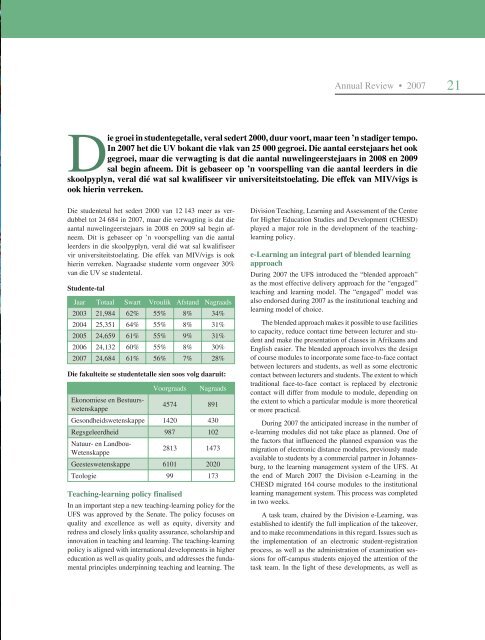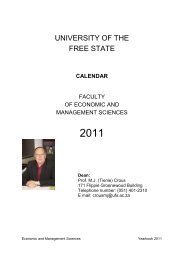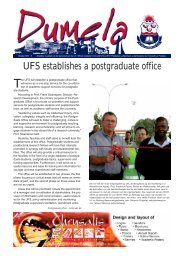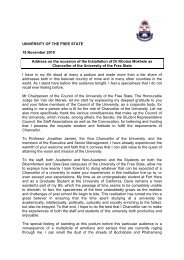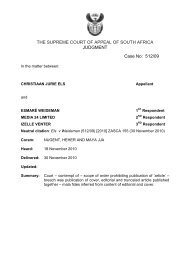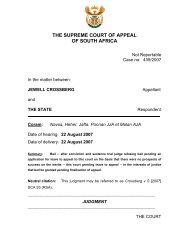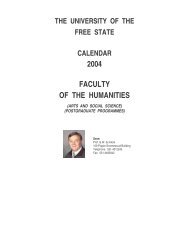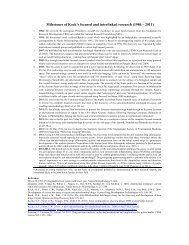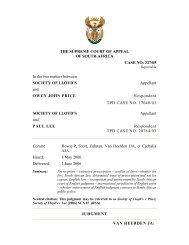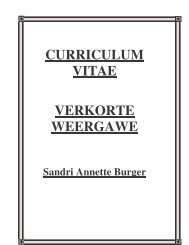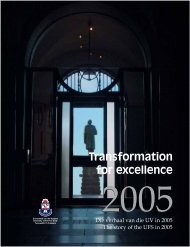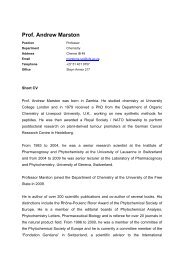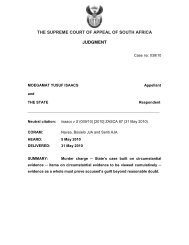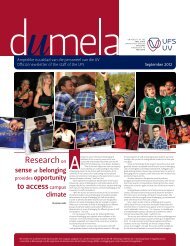UV Jaaroorsig - University of the Free State
UV Jaaroorsig - University of the Free State
UV Jaaroorsig - University of the Free State
Create successful ePaper yourself
Turn your PDF publications into a flip-book with our unique Google optimized e-Paper software.
Annual Review • 2007 21<br />
Die groei in studentegetalle, veral sedert 2000, duur voort, maar teen ’n stadiger tempo.<br />
In 2007 het die <strong>UV</strong> bokant die vlak van 25 000 gegroei. Die aantal eerstejaars het ook<br />
gegroei, maar die verwagting is dat die aantal nuwe lingeerstejaars in 2008 en 2009<br />
sal begin afneem. Dit is gebaseer op ’n voorspelling van die aantal leerders in die<br />
skoolpyplyn, veral dié wat sal kwalifiseer vir universiteitstoelating. Die effek van MIV/vigs is<br />
ook hierin verreken.<br />
Die studentetal het sedert 2000 van 12 143 meer as verdubbel<br />
tot 24 684 in 2007, maar die verwagting is dat die<br />
aantal nuwelingeerstejaars in 2008 en 2009 sal begin afneem.<br />
Dit is gebaseer op ’n voorspelling van die aantal<br />
leerders in die skoolpyplyn, veral dié wat sal kwalifiseer<br />
vir universiteitstoelating. Die effek van MIV/vigs is ook<br />
hierin verreken. Nagraadse studente vorm ongeveer 30%<br />
van die <strong>UV</strong> se studentetal.<br />
Studente-tal<br />
Jaar Totaal Swart Vroulik Afstand Nagraads<br />
2003 21,984 62% 55% 8% 34%<br />
2004 25,351 64% 55% 8% 31%<br />
2005 24,659 61% 55% 9% 31%<br />
2006 24,132 60% 55% 8% 30%<br />
2007 24,684 61% 56% 7% 28%<br />
Die fakulteite se studentetalle sien soos volg daaruit:<br />
Voor graads Nagraads<br />
Eko no miese en Be stuursweten<br />
skap pe<br />
4574 891<br />
Ge sond heids weten skap pe 1420 430<br />
Regs geleerd heid 987 102<br />
Natuur- en Landbou-<br />
Wetenskappe<br />
2813 1473<br />
Geesteswetenskappe 6101 2020<br />
Teologie 99 173<br />
Teaching-learning policy finalised<br />
In an important step a new teaching-learning policy for <strong>the</strong><br />
UFS was approved by <strong>the</strong> Senate. The policy focuses on<br />
quality and excellence as well as equity, diversity and<br />
redress and closely links quality assurance, scholarship and<br />
innovation in teaching and learning. The teaching-learning<br />
policy is aligned with international developments in higher<br />
education as well as quality goals, and addresses <strong>the</strong> fundamental<br />
principles underpinning teaching and learning. The<br />
Division Teaching, Learning and Assessment <strong>of</strong> <strong>the</strong> Centre<br />
for Higher Education Studies and Development (CHESD)<br />
played a major role in <strong>the</strong> development <strong>of</strong> <strong>the</strong> teachinglearning<br />
policy.<br />
e-Learning an integral part <strong>of</strong> blended learning<br />
approach<br />
During 2007 <strong>the</strong> UFS introduced <strong>the</strong> “blended approach”<br />
as <strong>the</strong> most effective delivery approach for <strong>the</strong> “engaged”<br />
teaching and learning model. The “engaged” model was<br />
also endorsed during 2007 as <strong>the</strong> institutional teaching and<br />
learning model <strong>of</strong> choice.<br />
The blended approach makes it possible to use facilities<br />
to capacity, reduce contact time between lecturer and student<br />
and make <strong>the</strong> presentation <strong>of</strong> classes in Afrikaans and<br />
English easier. The blended approach involves <strong>the</strong> design<br />
<strong>of</strong> course modules to incorporate some face-to-face contact<br />
between lecturers and students, as well as some electronic<br />
contact between lecturers and students. The extent to which<br />
traditional face-to-face contact is replaced by electronic<br />
contact will differ from module to module, depending on<br />
<strong>the</strong> extent to which a particular module is more <strong>the</strong>oretical<br />
or more practical.<br />
During 2007 <strong>the</strong> anticipated increase in <strong>the</strong> number <strong>of</strong><br />
e-learning modules did not take place as planned. One <strong>of</strong><br />
<strong>the</strong> factors that influenced <strong>the</strong> planned expansion was <strong>the</strong><br />
migration <strong>of</strong> electronic distance modules, previously made<br />
available to students by a commercial partner in Johan nesburg,<br />
to <strong>the</strong> learning management system <strong>of</strong> <strong>the</strong> UFS. At<br />
<strong>the</strong> end <strong>of</strong> March 2007 <strong>the</strong> Division e-Learning in <strong>the</strong><br />
CHESD migrated 164 course modules to <strong>the</strong> institutional<br />
learning management system. This process was completed<br />
in two weeks.<br />
A task team, chaired by <strong>the</strong> Division e-Learning, was<br />
established to identify <strong>the</strong> full implication <strong>of</strong> <strong>the</strong> takeover,<br />
and to make recommendations in this regard. Issues such as<br />
<strong>the</strong> implementation <strong>of</strong> an electronic student-registration<br />
pro cess, as well as <strong>the</strong> administration <strong>of</strong> examination sessions<br />
for <strong>of</strong>f-campus students enjoyed <strong>the</strong> attention <strong>of</strong> <strong>the</strong><br />
task team. In <strong>the</strong> light <strong>of</strong> <strong>the</strong>se developments, as well as


